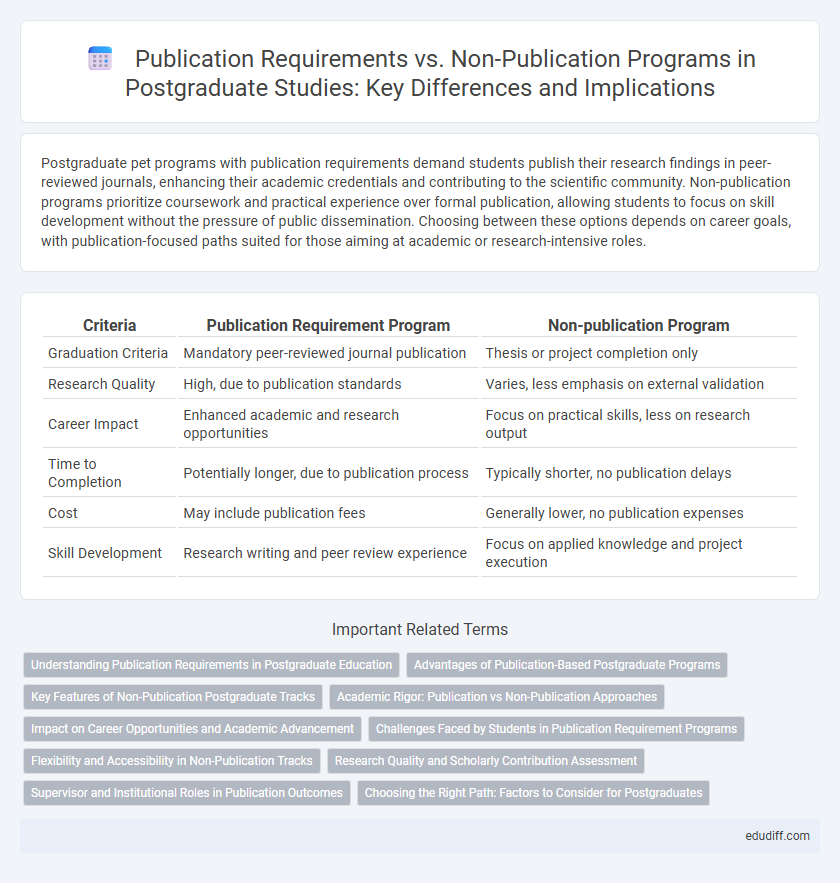Postgraduate pet programs with publication requirements demand students publish their research findings in peer-reviewed journals, enhancing their academic credentials and contributing to the scientific community. Non-publication programs prioritize coursework and practical experience over formal publication, allowing students to focus on skill development without the pressure of public dissemination. Choosing between these options depends on career goals, with publication-focused paths suited for those aiming at academic or research-intensive roles.
Table of Comparison
| Criteria | Publication Requirement Program | Non-publication Program |
|---|---|---|
| Graduation Criteria | Mandatory peer-reviewed journal publication | Thesis or project completion only |
| Research Quality | High, due to publication standards | Varies, less emphasis on external validation |
| Career Impact | Enhanced academic and research opportunities | Focus on practical skills, less on research output |
| Time to Completion | Potentially longer, due to publication process | Typically shorter, no publication delays |
| Cost | May include publication fees | Generally lower, no publication expenses |
| Skill Development | Research writing and peer review experience | Focus on applied knowledge and project execution |
Understanding Publication Requirements in Postgraduate Education
Understanding publication requirements in postgraduate education is crucial for academic progress and career advancement. Programs mandating publications often emphasize peer-reviewed journal articles, promoting rigorous research and enhancing scholarly communication skills. Conversely, non-publication tracks may focus more on coursework and comprehensive exams, catering to students aiming for professional practice rather than academic dissemination.
Advantages of Publication-Based Postgraduate Programs
Publication-based postgraduate programs enhance academic credibility by requiring students to produce peer-reviewed articles, which strengthens research quality and visibility. These programs facilitate early career development by providing tangible evidence of scholarly productivity, essential for academic and professional advancement. Engaging in publication processes also fosters critical thinking and communication skills, preparing graduates for competitive research environments.
Key Features of Non-Publication Postgraduate Tracks
Non-publication postgraduate tracks emphasize coursework, comprehensive exams, and practical applications over journal publications, catering to students pursuing professional practice or industry roles. Key features include structured curricula with a focus on skill development, project-based assessments, and mentorship tailored to real-world challenges. These programs often offer greater flexibility in research topics and timelines, enhancing accessibility for working professionals.
Academic Rigor: Publication vs Non-Publication Approaches
Publication requirement in postgraduate programs enhances academic rigor by demanding original research, peer-reviewed validation, and contributions to scholarly discourse. Non-publication programs often emphasize coursework and comprehensive exams, which may prioritize breadth of knowledge over original research output. The publication approach fosters critical thinking, methodological precision, and professional recognition through dissemination in academic journals.
Impact on Career Opportunities and Academic Advancement
Publication requirements in postgraduate programs significantly enhance career opportunities by demonstrating research competence and contributing to academic visibility, which is highly valued by employers and academic institutions. Non-publication programs may limit exposure to scholarly communities, potentially restricting pathways to competitive research positions and advanced academic roles. Graduates from publication-focused programs often experience greater success in securing grants, fellowships, and tenure-track positions due to their proven research output.
Challenges Faced by Students in Publication Requirement Programs
Publication requirement programs impose significant challenges on postgraduate students, including the pressure to produce publishable research within strict deadlines and the need to meet rigorous peer-review standards. Limited access to research funding, mentorship, and high-impact journals further complicates the publication process, often leading to increased stress and extended completion times. These constraints can hinder academic progress and affect the overall quality of postgraduate research outputs.
Flexibility and Accessibility in Non-Publication Tracks
Non-publication postgraduate programs offer enhanced flexibility by allowing students to tailor their studies without the pressure of producing published research, making them accessible to professionals balancing work and academics. These programs often accommodate diverse learning styles and career goals, removing barriers linked to the traditional publication process. The accessibility of non-publication tracks broadens postgraduate education to include more candidates who seek advanced knowledge without the stringent demands of scholarly dissemination.
Research Quality and Scholarly Contribution Assessment
Postgraduate programs with publication requirements prioritize rigorous research methodologies and empirical validation, enhancing the scholarly contribution through peer-reviewed articles that advance academic discourse. Non-publication programs emphasize theoretical frameworks and comprehensive knowledge synthesis, often assessed through theses or dissertations, highlighting originality and critical analysis over journal dissemination. Research quality in publication-driven tracks is measured by impact factors and citation metrics, whereas non-publication programs rely on comprehensive argumentation and methodological soundness to evaluate scholarly contribution.
Supervisor and Institutional Roles in Publication Outcomes
Supervisors in publication-required postgraduate programs actively guide students through research writing, ensuring alignment with academic standards to enhance publication success. Institutions provide structured resources such as workshops, funding opportunities, and peer-review platforms that directly influence publication outcomes by fostering a research-intensive culture. In contrast, non-publication programs often emphasize coursework with limited institutional support for research dissemination, resulting in fewer publication outputs despite supervisory involvement.
Choosing the Right Path: Factors to Consider for Postgraduates
Postgraduates must evaluate publication requirements when selecting their academic path, balancing the necessity of peer-reviewed articles against program goals and career aspirations. Publication programs often enhance research skills, academic visibility, and competitiveness for doctoral studies or academic positions. Non-publication tracks may focus more on practical skills, interdisciplinary learning, or professional development, appealing to students targeting industry roles or applied research careers.
Publication Requirement vs Non-publication Program Infographic

 edudiff.com
edudiff.com